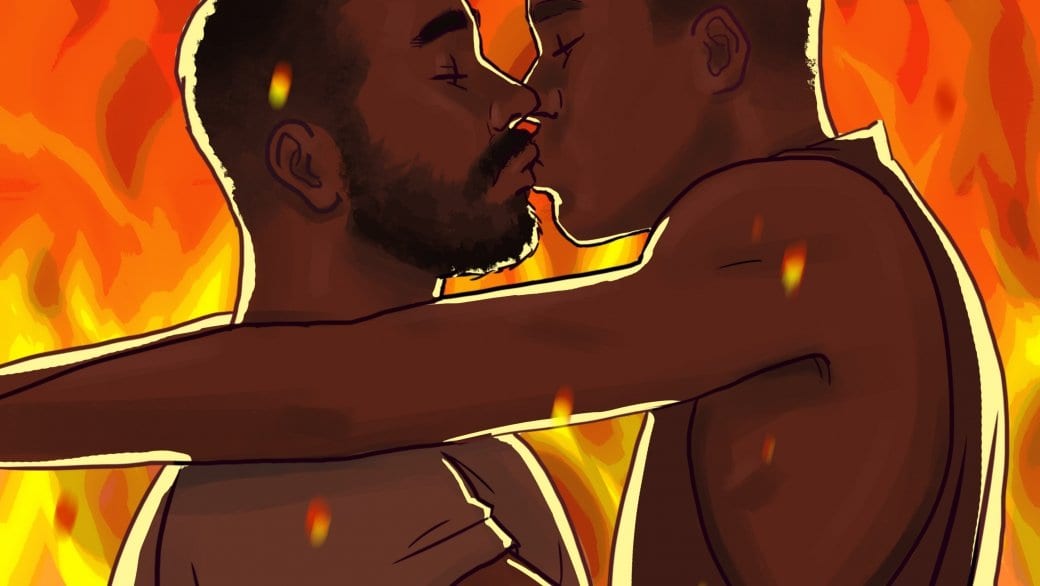Engaging in a little man-on-man action would get you burned alive in Rome after 390 CE. You’d probably also find yourself blamed for any famine that happened to be going on at the time.
Ever since the creation of Islam in the 7th century, homosexuality has been illegal in most Muslim countries. Even today, the penalty is often death.
If you were a man who had homosexual sex in 13th century France, you’d be castrated for the first offence, dismembered for the second and burned for the third. If you were a homosexual woman, you’d be dismembered twice, and then burned.
Men were strung up for buggery in England between 1534 and 1861. After 1885, you could find yourself charged with “gross indecency” like Oscar Wilde or Alan Turing, both of whom died, one way or another, as a result of their punishments.
If you were unlucky enough to be an indiscreet cock-loving man in The Netherlands between 1730 and 1732, you could have been among those who were strangled, burnt, drowned or hanged, in a kind of anti-gay frenzy that swept the country at the time.
If you were a bit of a pansy or a lezzy in Germany when Hitler came to power in 1933, you could easily have found yourself in jail or in a concentration camp (and probably in your grave before too long).
And on June 12, 2016, a hate-filled man walked into a gay nightclub in Orlando, Florida with a handgun and a semi-automatic rifle.
Queer history is gruesome. It’s a history of governments, of religious organizations, of parents, of colleagues, of acquaintances and of neighbours, beating us, burning us, drowning us, strangling us. Shooting us in Pulse nightclub.
Justifications for this violence against us have never made sense, and have never been convincing, to any intelligent person. It’s based on vague religious doctrines. On twisted moralities. On the idea that we’re weak, that we’re disgusting, that we’re all basically pedophiles. They’ve always found a reason.
How can we begin to process this history of persecution? What can we learn from it?
The most obvious take-away is that we persevere. In spite of Orlando, and of the litany of examples in history, we’re still here. We hang on and fight. And as a result, for many of us — especially those of us who live in the western world — there has never been a better time to be alive and queer.
It’s true and it’s a comforting thing to hear, but I think there’s a more important message: we need to preserve those things that make us strong.
Many of us act as though the struggle is over. We’re gradually drifting away from the safety of our Villages, and abandoning our Prides and queer-specific social groups, medical clinics, community centres, bookstores, media outlets — all of those things we originally built up to keep us loud, strong, healthy and safe. Why? Because we have same-sex marriage in Canada now. So, we don’t need that stuff, right? We’re fine.
My response is that, leaving aside the fact that not all of us are fine (not the trans community, the racialized communities, the homeless queer youth, the queers overseas, the seniors), we may not be fine forever. And when things finally do go tits up and we need an organized queer community that can raise money for legal defences, can organize marches, can get the word out in newspapers and on websites, and all of that, those resources might not be there anymore.
Orlando should remind us that our history is a bloody one, punctuated by tragedies, and that the gains (in terms of rights and freedom) won over a decade or even a century of work can be lost in the next.
Consider Russia’s tumultuous history. A homosexual during the 14th and 17th centuries had it made. Things were worse in the 18th and 19th. Then they were better again after Tsar Nicholas II issued his October Manifesto in 1905. Then they were worse when Stalin criminalized homosexuality in 1934. Then they got better when it was decriminalized in 1993. But since 2006, things have gotten worse and worse for queers in that country.
It’s better to take the long view: our history shows us that the next tragedy is always just around the corner. If we need to adapt our queer institutions to the changing needs of the times, we should. If we need to replace a few, we should. But let’s not lose our strength by fading away into the mainstream.
History Boys appears on Daily Xtra on the first and third Tuesday of every month. You can also follow them on Facebook.


 Why you can trust Xtra
Why you can trust Xtra


